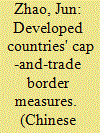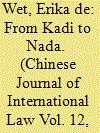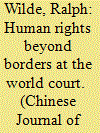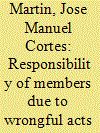| Srl | Item |
| 1 |
ID:
126075


|
|
|
|
|
| Publication |
2013.
|
| Summary/Abstract |
Certain developed countries are exploring the possibility of imposing border measures to address the issues of "competitive disadvantage" and "carbon leakage" caused by asymmetric climate change policies in different countries. This article examines whether these border measures can satisfy the chapeau requirement1 under Article XX of GATT, which is probably the most significant procedural hurdle under the WTO framework. Furthermore, this article takes stock of China's domestic actions to combat climate change as well as their potential effectiveness, and then analyses the motivations behind those actions.2 After that, this article probes into China's potential advisable reactions towards these possible border measures, including China's domestic institutional building.
|
|
|
|
|
|
|
|
|
|
|
|
|
|
|
|
| 2 |
ID:
126072


|
|
|
|
|
| Publication |
2013.
|
| Summary/Abstract |
Article 2.1 (only the part containing the national treatment obligation) of the Agreement on Technical Barriers to Trade (TBT) has been interpreted and applied for the first time in three recent TBT disputes since the establishment of the World Trade Organization. This article will illustrate that the interpretive approach adopted by the Appellate Body, however, created a complicated relationship between TBT Article 2.1 and other WTO provisions. It created an irreconcilable interpretive conflict between TBT Article 2.1 and GATT Article III:4. It also introduced one same key test in the analysis of TBT Article 2.1 and 2.2 under a certain condition while they contain two different obligations. Finally, it sent out a confusing message concerning the applicability of GATT Article XX to TBT Article 2.1.
|
|
|
|
|
|
|
|
|
|
|
|
|
|
|
|
| 3 |
ID:
126074


|
|
|
|
|
| Publication |
2013.
|
| Summary/Abstract |
This contribution analyses the implications of the Kadi decision of the European Court of Justice of July 2013 and the Nada decision of the European Court of Human Rights of September 2013. Both decisions have given preference to human rights standards over United Nations Security Council (UNSC) sanctions stemming from the Resolution 1267 (1999) sanctions regime. However, they used very different techniques in coming to similar results, with implications for the effective enforcement of UNSC binding decisions and the unity of international law.
|
|
|
|
|
|
|
|
|
|
|
|
|
|
|
|
| 4 |
ID:
126069


|
|
|
|
|
| Publication |
2013.
|
| Summary/Abstract |
This article uses the case study of the question of whether human rights treaty law applies extraterritorially as a means of exploring the general theme of the value of the International Court of Justice's involvement in human rights, when compared to such involvement by specialist human rights bodies. The Court's express pronouncements on the issue, in the Wall Advisory Opinion, the DRC v. Uganda judgment, and the Provisional Measures Order in Georgia v. Russia, as well as an earlier more general statement in the Namibia Advisory Opinion, are compared to determinations on the issue by specialist courts and tribunals. The article begins by setting out the broader historical context of the ICJ's involvement in human rights issues. It then analyses the different ways in which this involvement can be critically appraised, in the process making the case for the focus adopted herein, on a comparison between the role of the Court and that of specialist human rights tribunals on issues of meaning/interpretation rather than application/enforcement, and, within this, on comparative analysis concerned with the generalist/specialist distinction itself rather than the relative merits of positions taken on the substantive law. Such a focus is then deployed through a detailed critical evaluation of the Court's statements in the decisions indicated. Finally, the article summarizes the significance of the Court's determinations on the extraterritorial application of human rights law, and the broader relevance of these determinations for understanding the role of the ICJ in the field of human rights more generally.
|
|
|
|
|
|
|
|
|
|
|
|
|
|
|
|
| 5 |
ID:
126073


|
|
|
|
|
| Publication |
2013.
|
| Summary/Abstract |
The advisory opinion rendered by the Seabed Disputes Chamber of the International Tribunal for the Law of the Sea in the Responsibilities and Obligations of the Sponsoring States case clarified some important issues concerning the deep seabed mining regime of the Convention on the Law of the Sea. Particularly, the obligation to ensure undertaken by the sponsoring State is an obligation of "due diligence"; the "necessary and appropriate measures" may also be used to clarify the due diligence obligation; the conditions for the liability of the sponsoring State to arise are defined; and the contractor and the sponsoring State do not bear joint and several liability. Nevertheless, some relevant issues need further clarification.
|
|
|
|
|
|
|
|
|
|
|
|
|
|
|
|
| 6 |
ID:
126070


|
|
|
|
|
| Publication |
2013.
|
| Summary/Abstract |
While for the most part the attribution hypothesis raised by the International Law Commission (ILC) in its articles on the responsibility of international organizations are still purely theoretical, the eventual subsidiary responsibility of the members is marked by a high degree of importance which also counts on numerous precedents. In this alleged scenario, the attributable responsibility of the members would exclusively arise under its membership condition vis-à-vis the international organization-without considering any type of help, assistance, execution, control or coercion exercised by the international organization in the perpetration of the wrongful act. This paper aims to study this subject by conducting a thorough analysis of the theories addressing this issue which have been elaborated over time, the case law, the private codifications and the political arguments set out in the doctrine. All of this will be confronted with the articles adopted by the ILC in 2011. Finally, this study will conclude by assessing whether members are obliged to provide funding so as to enable the organization to fulfil its obligations of repairing the damage caused by the wrongful act.
|
|
|
|
|
|
|
|
|
|
|
|
|
|
|
|